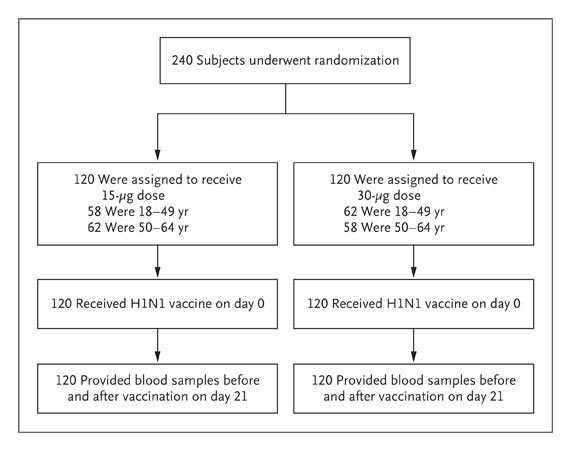

A total of 240 individuals were enrolled in the trial and given 15 or 30 microgram doses of an inactivated, H1N1 vaccine propagated in eggs by CSL Biotherapies, Parkville, Australia. Anti-influenza antibody titers were measured at enrollment and 21 days after each vaccination, by hemaggultination-inhibition (HI) and microneutralization assays.
A single 15-µg or 30-µg dose of the H1N1 vaccine produced a robust immune response in most subjects. Day 21 titers of 1:40 or more on HI assay were observed in 96.7% of those who received the 15 µg dose and in 93.3% of those who received the 30 µg dose. In total, 74.2% of subjects showed a significant seroconversion or increase in HI titer. Protection of humans against seasonal influenza is generally believed to require a HI titer of 1:40 or more.
Some of the side effects of immunization included injection-site tenderness, pain, swelling, and headache.
Whether similar results will be obtained in children, and using vaccine manufactured by other companies remains to be determined.
The ability of one dose of adjuvant-free H1N1 vaccine to induce a strong immune response has two important benefits. One is that twice as many individuals can be immunized than if two doses were required. And a return visit for a second dose of pandemic H1N1 vaccine won’t be needed.
Michael E. Greenberg, M.D., M.P.H., Michael H. Lai, B.Med.Sc., M.B., B.S., M.Med.Sc., Gunter F. Hartel, M.S., Ph.D., Christine H. Wichems, Ph.D., Charmaine Gittleson, B.Sc., M.B., B.Ch., Jillian Bennet, M.Sc., M.P.H., Gail Dawson, B.Pharm., Wilson Hu, M.D (2009). Response after One Dose of a Monovalent Influenza A (H1N1) 2009 Vaccine New England Journal of Medicine : 10.1056/NEJMoa0907413

Pingback: Tweets that mention Single dose of 2009 H1N1 vaccine immunogenic in adults -- Topsy.com
Will it be suggested that those who have already been exposed to the H1N1 virus still get the vaccines? If so, what benefit would it provide that would outweigh any risks? Are titer tests available since this virus has seemingly propagated nearly everywhere in the last 5 months?
If you have had laboratory confirmed infection with 2009 swine-origin
H1N1, then there is no need to receive the vaccine. According to the
CDC, “None of the currently FDA approved rapid influenza diagnostic
tests can distinguish between influenza A virus subtypes (e.g.
seasonal influenza A (H3N2) versus seasonal influenza A (H1N1)
viruses)”. Therefore you will have to convince your health care
provider to have an assay done which detects viral RNA, or a
serological assay to detect antibodies to the virus.
gene lengths of influenza viruses.
gene lengths of influenza viruses.